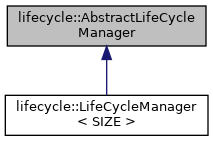The abstract base class of all LifeCycleManager. More...
#include <fastarduino/lifecycle.h>

Public Member Functions | |
| template<typename T > | |
| uint8_t | register_ (LifeCycle< T > &instance) |
Register a LifeCycle<T> instance with this LifeCycleManager. More... | |
| bool | unregister_ (uint8_t id) |
Unregisters a LifeCycle<T> instance, identified by id, already registered with this LifeCycleManager. More... | |
| uint8_t | available_ () const |
Return the number of available "slots" for registration of new LifeCycle<T> instances. More... | |
| bool | move_ (uint8_t id, AbstractLifeCycle &dest) |
Move an already registered LifeCycle<T> instance (identified by id) to a new location, determine by dest. More... | |
| template<typename T > | |
| LifeCycle< T > * | find_ (uint8_t id) const |
Find an existing LifeCycle<T> registered with this LifeCycleManager and identified by id. More... | |
Detailed Description
The abstract base class of all LifeCycleManager.
It encapsulates all needed API for lifecycle management.
- See also
- LifeCycleManager
- LifeCycle
Definition at line 131 of file lifecycle.h.
Member Function Documentation
◆ register_()
|
inline |
Register a LifeCycle<T> instance with this LifeCycleManager.
From now on, instance is tracked by this LifeCycleManager, in particular if it is moved around, its latest address is updated. It is assigned a unique identifier so that it can be retrieved, later on, by calling find_().
- Warning
- This method is NOT synchronized and should be called either from an ISR, or from a synchronized block.
- Template Parameters
-
T the type encapsulated in a LifeCycle<T>type
- Parameters
-
instance a reference to an LifeCycle<T>to register with this LifeCycleManager
- Returns
- a unique identifier for the registered instance
- Return values
-
0 if an error occurred; this can happen when too many instances are already registered with this LifeCycleManager, or when instanceis already registered (with yhis or any LifeCycleManager).
- See also
- LifeCycle
- unregister_()
- find_()
Definition at line 156 of file lifecycle.h.
◆ unregister_()
|
inline |
Unregisters a LifeCycle<T> instance, identified by id, already registered with this LifeCycleManager.
- Note
- This is automatically called by
LifeCycle<T>destructor.
- Warning
- This method is NOT synchronized and should be called either from an ISR, or from a synchronized block.
- Parameters
-
id the unique identifier for the LifeCycle<T>instance to unregister; this is the value returned by register_().
- Return values
-
true if the LifeCycle<T>instance was found and successfully deregisteredfalse if there is no registered instance identified by id
- See also
- register_()
Definition at line 178 of file lifecycle.h.
◆ available_()
|
inline |
Return the number of available "slots" for registration of new LifeCycle<T> instances.
- Note
- This method is atomic, hnece it can freely be called from an ISR or normal code without any synchronization required.
Definition at line 198 of file lifecycle.h.
◆ move_()
|
inline |
Move an already registered LifeCycle<T> instance (identified by id) to a new location, determine by dest.
Once this method is called, the previous LifeCycle<T> instance becomes unusable (its identifier is reset to 0).
- Warning
- This method is automatically called when a registered
LifeCycle<T>is moved to another instance. You should normally never need to call this method directly. - This method is NOT synchronized and should be called either from an ISR, or from a synchronized block.
- Parameters
-
id the unique identifier for the LifeCycle<T>instance to move; this is the value returned by register_().dest a reference to a LifeCycle<T>instance to receive the instance currently identified byid
- Return values
-
true if the LifeCycle<T>instance was found and successfully moved todestfalse if there is no registered instance identified by id
Definition at line 224 of file lifecycle.h.
◆ find_()
|
inline |
Find an existing LifeCycle<T> registered with this LifeCycleManager and identified by id.
This is the only way to get a pointer to the right location of an instance.
- Warning
- A LifeCycleManager can hold
LifeCycle<T>instances of anyTtype, it does not keep information about actual type of a LifeCycle; hence it cannot ensure safe casting infind_()method. It is the responsibility of the application developer to ensure consistency of the type used inregister_()and infind_()for the sameid! - This method is NOT synchronized and should be called either from an ISR, or from a synchronized block.
- Template Parameters
-
T the type encapsulated in a LifeCycle<T>type
- Parameters
-
id the unique identifier for the LifeCycle<T>instance to look for; this is the value returned by register_().
- Returns
- a pointer to the found
LifeCycle<T>instance
- Return values
-
nullptr if there is no registered instance identified by id
- See also
- LifeCycle
- register_()
Definition at line 263 of file lifecycle.h.
The documentation for this class was generated from the following file:
- fastarduino/lifecycle.h